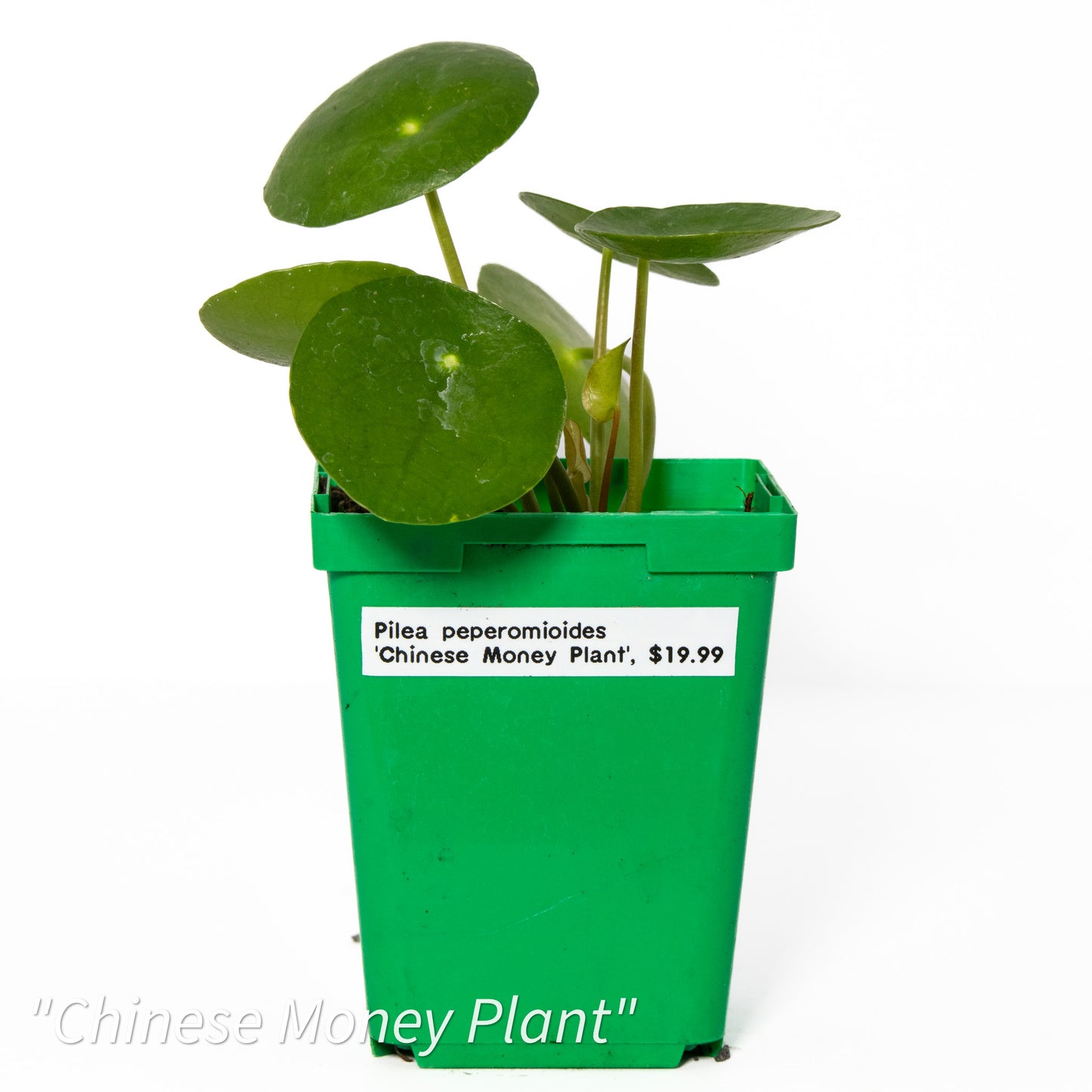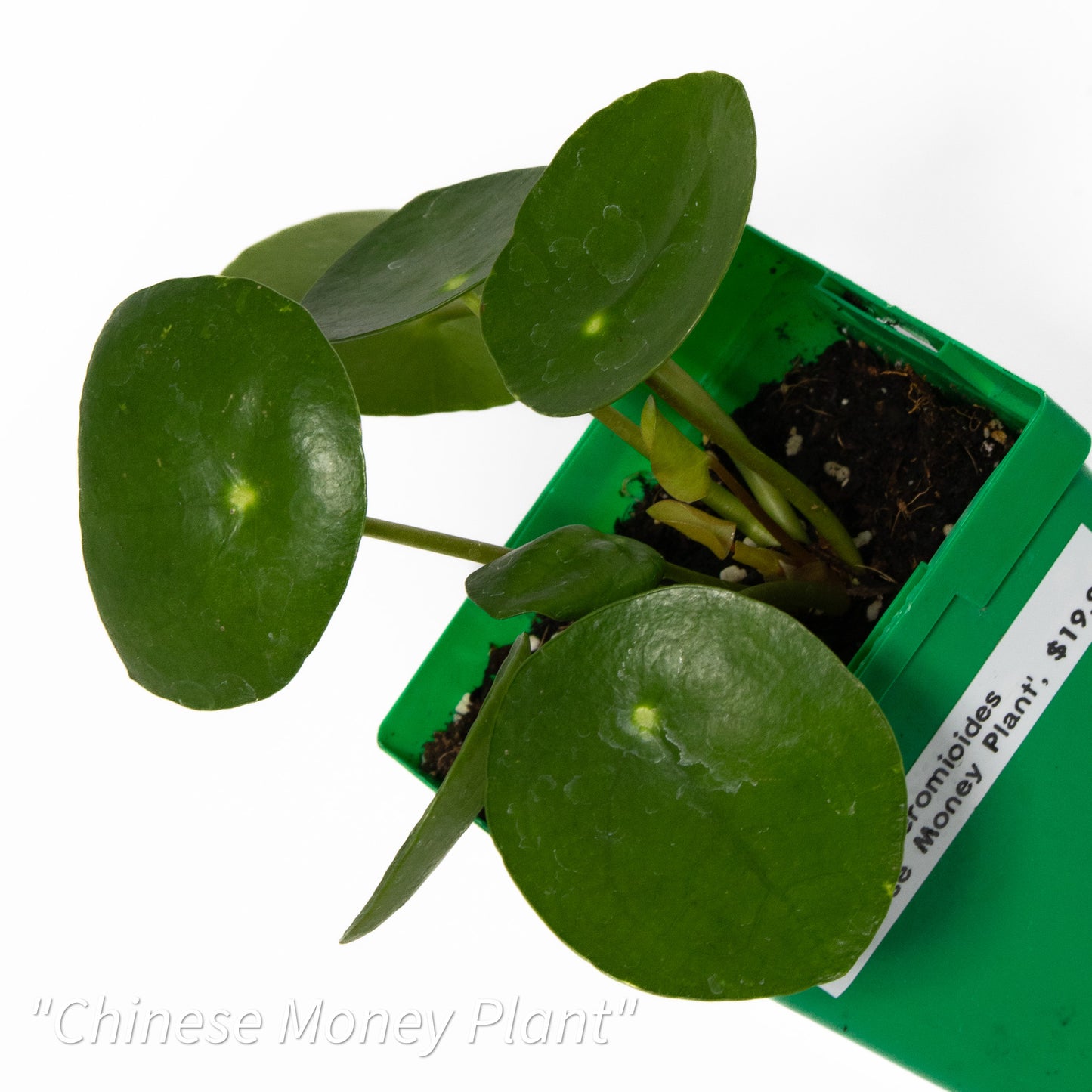Royal Python's Cove
Pilea peperomioides ‘Chinese Money Plant’
Pilea peperomioides ‘Chinese Money Plant’
Couldn't load pickup availability
Pilea peperomioides, commonly known as the Chinese Money Plant, is a popular and striking houseplant known for its round, coin-shaped leaves on tall, upright stems. Native to China, this plant has gained popularity for its easy care and unique aesthetic. It is often favored for terrariums, vivariums, and bioactive setups due to its compact size and ability to thrive in moderate conditions.
Care Instructions
LIGHT. Prefers bright, indirect light but can adapt to medium light. Too much direct sunlight can cause the leaves to scorch, so it’s best to place the plant in a well-lit area with filtered light. In bioactive setups, place it near a light source but keep it out of direct sun exposure to maintain healthy foliage.
SOIL. A well-draining, slightly acidic to neutral soil mix is ideal. A blend of coconut coir, perlite, and pine bark will provide a balanced environment that ensures the plant's roots are well-aerated and that water drains properly. In bioactive setups, a substrate mix that supports the plant while allowing decomposers like isopods and springtails to thrive is ideal.
WATERING. Water when the top 1-2 inches of soil feel dry. Pilea peperomioides does not like being overwatered, so ensure the soil drains well and that the plant doesn't sit in excess water. Underwatering can lead to leaf drop, while overwatering may cause root rot. In bioactive setups, a well-balanced moisture level should be maintained by decomposers that help regulate excess organic matter.
HUMIDITY. Prefers moderate humidity levels around 40-60%. While it doesn’t need extremely high humidity, it will benefit from slightly higher humidity, especially in bioactive environments. Adding springtails and isopods can help maintain moisture balance in the soil, promoting healthier root systems.
TEMPERATURE. Prefers temperatures between 60°F and 75°F (16°C to 24°C). Avoid placing the plant in areas where it is exposed to cold drafts or temperatures lower than 50°F (10°C). In bioactive enclosures, ensure the temperature remains steady for optimal growth.
FERTILIZATION. During the growing season (spring and summer), feed with a balanced liquid fertilizer every 4-6 weeks. In winter, reduce or stop fertilizing as the plant enters a dormant phase. In bioactive setups, natural fertilizers like Mealworm Frass or composted materials can provide slow-release nutrients that benefit both the plant and the ecosystem.
Cohabitation with Bioactive Organisms
ISOPODS. Isopods help break down plant matter, keeping the soil aerated and enriching the substrate with nutrients. They help maintain a healthy balance in bioactive setups by breaking down dead plant material, which is essential for the growth of Pilea peperomioides.
SPRINGTAILS. These tiny arthropods help manage mold and decaying organic matter in the substrate, ensuring that the plant's roots remain healthy and free from fungal infections. Their work keeps the soil clean and contributes to a balanced ecosystem in the enclosure.
Soil and Maintenance Tips
SUBSTRATE. A well-draining substrate is key for the health of the Chinese Money Plant. Use a mix of coconut coir, perlite, and pine bark to ensure good drainage and aeration. A thin layer of activated charcoal can be added at the bottom to help with odor control and improve soil health.
HUMIDITY CONTROL. While it doesn’t require high humidity, maintaining moderate moisture levels through misting or water dishes will ensure the plant thrives. Springtails and isopods can help manage moisture in bioactive environments by breaking down excess organic material and keeping the soil balanced.
TRIMMING. Pilea peperomioides can grow quite tall, and trimming the stems regularly can help maintain its compact shape and encourage fuller growth. You can propagate the plant easily by cutting off the pups (small offshoots) and growing them in water or soil.
PEST CONTROL. Pilea peperomioides is relatively pest-resistant, but in a bioactive environment, springtails and isopods help control any pests like aphids or mealybugs by consuming their eggs and larvae. Keeping the substrate healthy with the help of decomposers ensures that the plant stays pest-free.
With its round, coin-shaped leaves and easy care requirements, Pilea peperomioides is an excellent choice for bioactive enclosures, offering aesthetic value and contributing to the overall health of the ecosystem. By providing it with adequate light, moisture, and soil, you’ll ensure the plant thrives and adds a touch of natural beauty to your setup.
Share




